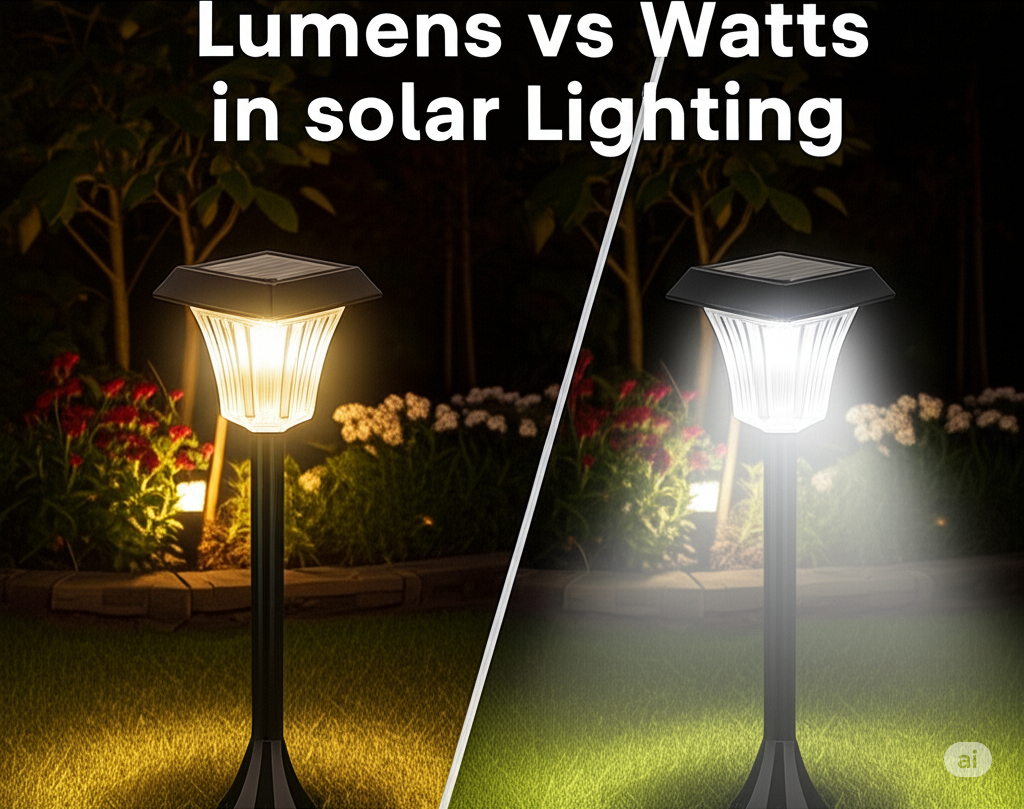
Lumens vs Watts for Solar Lights: How to Choose the Right Brightness
Lumens vs Watts for Solar Lights: What You Need to Know Before You Buy
When shopping for solar lights, you’ll often see terms like lumens and watts listed on the packaging. If you’re wondering what they mean — and more importantly, how they impact your solar lighting — you’re not alone!
In this guide, we’ll explain the difference between lumens and watts for solar lights, why they matter, and how to choose the right brightness and energy efficiency for your outdoor spaces.
Understanding Watts in Solar Lights
Watts measure energy consumption, not brightness. In solar lighting, watts indicate how much solar power the panel can capture and how much energy the light fixture uses to operate.
-
A higher wattage solar panel can store more energy during the day, allowing for longer run times and brighter lights at night.
-
A lower wattage solar light may require less sun exposure but will usually produce less brightness and shorter operating hours.
However, watts alone don't tell you how bright a solar light will be — that's where lumens come in.
What Are Lumens in Solar Lights?
Lumens measure the brightness of a solar light. The more lumens a light has, the brighter it will be.
For example:
-
A solar path light with 100 lumens gives off a soft glow, perfect for walkways.
-
A solar floodlight with 1000 lumens can brightly illuminate a driveway, garden, or backyard for security purposes.
When choosing solar lights, lumens are the critical number to focus on if brightness is your priority.
Lumens vs Watts: Which Is More Important for Solar Lights?
When it comes to solar-powered lights, both watts and lumens are important — but for different reasons:
| Lumens | Watts |
|---|---|
| Measures brightness | Measures energy usage |
| Higher lumens = brighter light | Higher watts = more power storage/consumption |
| Focus on lumens for visual needs | Focus on watts for efficiency and battery longevity |
In short:
-
Lumens = How bright your solar light will be.
-
Watts = How much energy your solar light needs and how efficiently it charges.
How Many Lumens Do You Need for Solar Lights?
Here's a quick guide for recommended lumens depending on where and how you plan to use your solar lights:
| Application | Recommended Lumens |
|---|---|
| Pathway Lighting | 100–200 lumens |
| Garden Accents | 50–300 lumens |
| Patio or Deck Lighting | 300–500 lumens |
| Security and Flood Lights | 700–1300 lumens |
| Driveway Lights | 500–1000 lumens |
Common Solar Light Wattages Explained
Most residential solar lights are low wattage, usually between 2W to 20W.
Higher wattage panels (above 10W) are typically used for solar floodlights, security lighting, or commercial applications where you need stronger, longer-lasting illumination.
Pro tip:
If you live in areas with less sunlight, choose solar lights with slightly higher wattage panels and good battery storage to ensure they stay powered even on cloudy days.
Why Energy Efficiency Matters in Solar Lights
Choosing a solar light with high lumens and lower wattage (thanks to efficient LED technology) is ideal. This means you’ll get:
-
Brighter light output
-
Faster charging during the day
-
Longer operating hours at night
-
Lower stress on the battery, leading to a longer lifespan
Look for LED solar lights specifically, as they offer the best lumens-per-watt ratio on the market.
Final Thoughts: Smart Solar Lighting Starts with Lumens and Watts
When buying solar lights, lumens tell you how bright the light will be, while watts tell you how much energy it needs to shine.
To make the best choice:
-
Match the lumens to the lighting task (pathway, security, garden accent, etc.)
-
Ensure the solar panel wattage fits your location’s sunlight availability
-
Prioritize LED bulbs for maximum efficiency
By understanding the relationship between lumens and watts, you’ll choose solar lights that are both energy-efficient and perfectly suited to your outdoor lighting needs.
Ready to light up your space sustainably?
Check out our top-rated solar lights designed for maximum brightness and all-day charging, even in low-sun areas!
